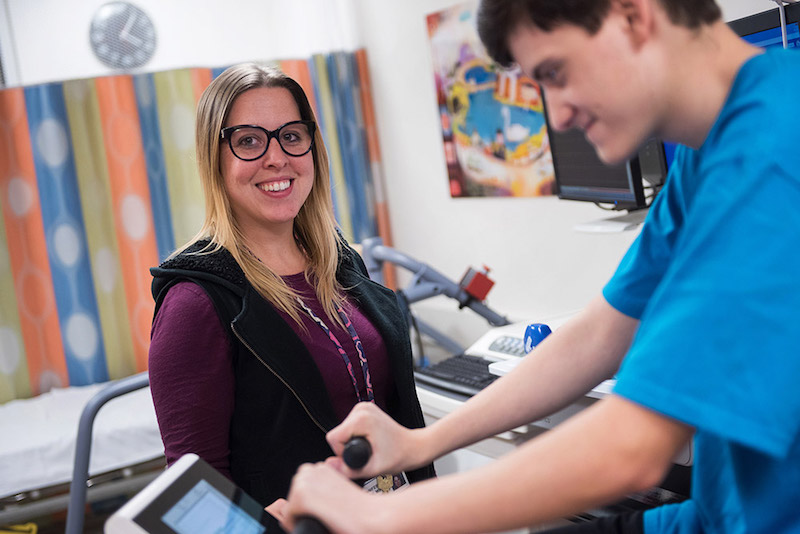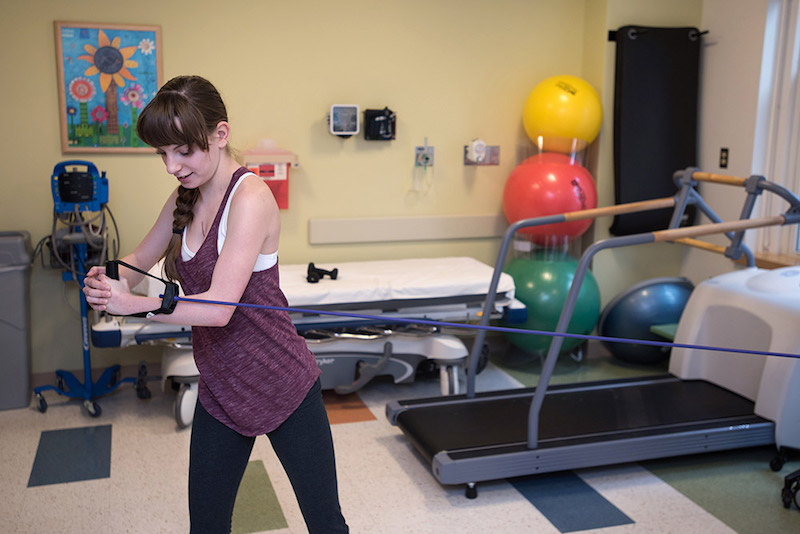Cardiac Fitness Program

The Cardiac Fitness Program at Boston Children’s Hospital was founded on the belief that children with congenital heart defects (CHDs) can and should achieve the same benefits of exercise as their peers. The program — one of only a few in the country — offers a safe, supervised, individually-tailored exercise and education program for children and adults with congenital heart conditions and pediatric-acquired heart disease.
The program works with patients ages 8 and older who have a wide range of heart conditions. Typical patients include those who could benefit from being more active, those recovering from surgery, or those who need help developing safe and effective exercise practices.
Taking a holistic approach to fitness
“We want to support our patients’ fitness as a whole, not just cardiovascular fitness, but boosting self-confidence in life skills as well,” says Naomi Gauthier, MD, director of the Cardiac Fitness Program. “Our goal is to help patients go beyond rehabilitation to reach a level of fitness they didn’t realize they could achieve.”
The program strives to empower kids and adults with CHD to participate in exercise, become more fit and develop a new attitude towards exercise.
“We know that the benefits of exercise often extend well beyond fitness and health, to greater confidence and improved overall quality of life,” says Gauthier.
An experienced team
“The Heart Center’s large patient volume, combined with clinical expertise and strong academic resources, sets our program apart from others of its kind,” says Gauthier.
The team’s five cardiologists all specialize in exercise physiology for CHD patients. Together, they have more than 70 years of experience in the assessment and management of exercise-related concerns in congenital heart patients of all ages. The cardiologists work closely with four exercise physiologists, all masters-level trained with extensive clinical experience, and a nutritionist to provide the best possible outcomes for patients.

Safety is a top priority
“Exercise training programs in children and young adults with CHD are indeed safe and proven to improve fitness,” says Gauthier. “All patients are assessed for risk and eligibility prior to starting the program, and our ability to monitor each patient’s heart rate and rhythm will now be increased a notch as we set up our brand new state-of-the-art wireless telemetry.”
Although serious problems during supervised exercise training are rare, the exercise lab is equipped with appropriate emergency equipment in the event of an emergency.
Inside a typical visit
At each visit, patients meet one-on-one with a clinical exercise physiologist to set specific goals and work on fitness, muscle strength and flexibility exercises. The exercise physiologist will also explain the principles of fitness training and help the patient develop a home exercise plan to supplement these in-person visits.
During the visit, patients also meet with a nutritionist to get information about a healthy diet. If the patient has any psychological or social needs, the team can make a referral to a psychologist.
Sessions are usually scheduled twice a week for 60 minutes for 12 to 16 weeks, depending on the individual needs of the patient. Every 30 days, the team meets to assesses the patient’s progress and develop renewed goals.
Looking toward a virtual future
Gauthier and her team have big plans for the future. In addition to producing home exercise videos, they’re also working on developing an interactive app that patients can use to track their exercise and mental outlook at home.
“Our big dream is to expand into the virtual world,” says Gauthier. “We want to have a greater impact on patients who are geographically unable to come to us, and eventually we’d like to develop a hybrid program for lower-complexity patients.”
Gauthier also hopes the Cardiac Fitness Program will serve as a model for other programs across the country.
“We’d like to invite like-minded providers to address this on a larger scale, and put our minds and expertise together to help implement similar programs in other places.”
For questions about the Cardiac Fitness Program, or to refer a patient, please email CardiacFitness@childrens.harvard.edu.
Related Posts :
-

Four things you should know about MAPCAs treatment
As the first grandchild in her family, Hannah Homan is in demand for frequent visits. She was also the focus ...
-

Treating MAPCAs with unifocalization surgery and cardiology care
Children born with a rare form of tetralogy of Fallot (ToF) face a challenging type of congenital heart ...
-

After surgeries to treat HLHS, Carter is healthy and happy at home in Florida
Carter Miller loves action. The 4-year-old Florida resident enjoys riding on golf carts and flying high on swing sets. ...
-

Advancing global health: Using AI to detect heart disease in children
In many low- and middle-income countries, pediatric cardiologists can’t help children with congenital heart conditions because of a critical ...





